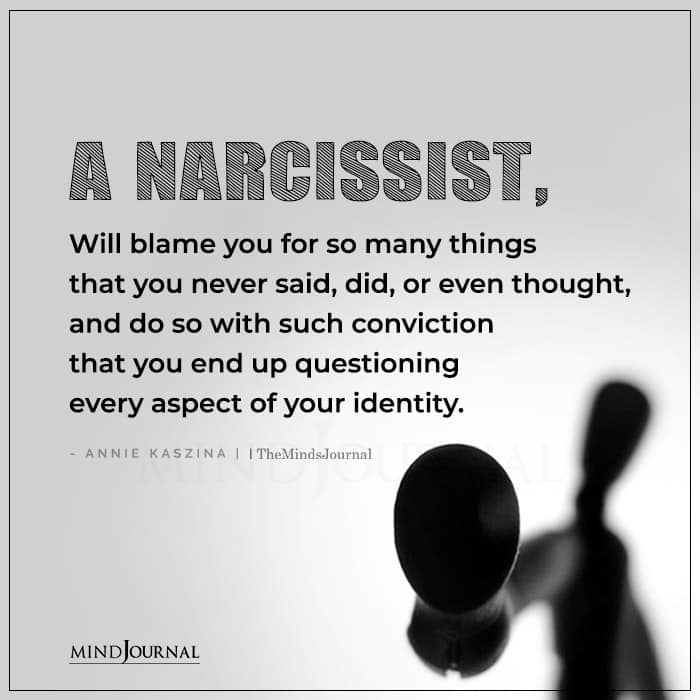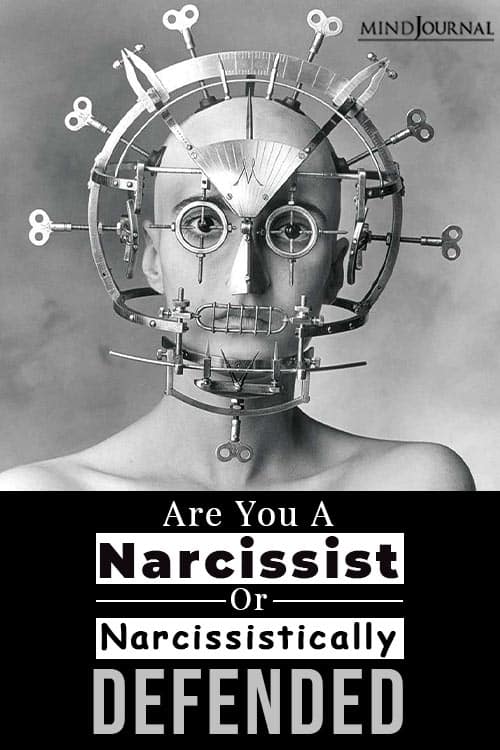Narcissists are dime a dozen, and by now, almost everyone has a really good idea about who they are, and how they function. But what about narcissistically defended people? Who are they, and how do they fit in this scenario?
Key Points
- Narcissists are grandiose personalities who have almost no ability to self-reflect.
- Those who are narcissistically defended worry about becoming narcissistic and are hypervigilant about anything focused on themselves.
- Narcissistically defended people often grew up with a narcissist in their family.
- A narcissistically defended person can start to become conscious by focusing on their own reactions and boundaries rather than the narcissist.
Recently, I’ve noticed the rise in social media about the topic of narcissism and then realized there’s been a lot said in recent years about narcissism, but nearly nothing about narcissistically defended people. In fact, most people have never heard the term.
First, let’s talk about the difference between these two personalities.
Read 8 Evasion Tactics Narcissists Use To Stop You From Questioning Them
Narcissism
Narcissistic people have practically no ability to self-reflect. They are grandiose personalities and have a wildly inflated view of their intelligence, their abilities, are constantly critical of others, and have a largely negative view of anyone else. In fact, the very things that they’re critical of in others are disowned aspects of themselves, which they project onto others without realizing they are doing so, when in fact their criticisms can be viewed more as unconscious confessions of their own shortcomings.
They largely consider themselves to be victims of those who may rightly accuse them of lacking empathy for others and lash out in anger whenever they are criticized. They become manufacturers of victimhood—“I’m the most persecuted person in history” or even, “You never call me.” They never consider themselves to be accountable for any negative experiences they may have caused. Everything that doesn’t fit into their view of themselves is “fake news.”
These people, I believe, are born this way and are not likely to change.

Narcissistically Defended
This is a term that many therapists are familiar with but which few others are. It’s ironic that most of the psychological research out there is about narcissists and not their victims, kind of like research imitating life. The narcissist gets all the attention, their victims get little.
People who are narcissistically defended often come from families in which they have suffered the indignities of one or more narcissistic members of their family. They worry that they share these traits and become hypervigilant about anything that is focused on themselves. They, unlike the narcissists, worry that they may also be narcissistic and are quick to apologize for most criticisms that come their way.
When criticized for being arrogant, for instance, they may be willing to say, “Well, you may be right. Let me think about that.” Upon reflection, they may think that even though the criticism is unfounded, they might accept accountability even though they don’t believe they deserve it.
They are not victimizers. Rather, they are the real victims of the narcissistic abusers in their life. In their past, they have been erased, unheard, and silenced. When confronted with a situation in which they feel this is happening, they can have a big reaction emotionally because they’re reminded of how they tried and failed to be seen or heard in their family.
Read 8 Tricks Narcissists Play To Manipulate Their Victims
The Family Dynamic
When the narcissistically defended person grows up in a family with one or more narcissistic parents, often they have been gaslighted, meaning that when they bring up the obvious fact that the parent never acknowledges their achievements—their school grades were never posted on the refrigerator, their successes in sports were ignored, or that the parents may not even notice that they are gone— they are met with, “What are you talking about? We’ve given you a roof over your head, clothed and fed you, and now you’re saying we’ve neglected you? Are you crazy?”.
The parent(s) deny reality and have no empathy for the pain they’ve caused. As an adult, the person may discover that the parents don’t even know or care about their profession or achievements in life. Psychiatrists call this behavior “benign neglect.”
The Golden Child
Often in such a family, one finds that there is a “Golden Child,” the one that the parent(s) prefer over all the others. That child can do no wrong. They get privileges that others don’t. If he or she does something harmful to the other siblings, the act is dismissed as silly jealousy or that the harm is imagined. The Golden Child then becomes sucked into the parent(s)’ narcissism and works hard to live up to the parent(s)’ expectations.
They must work hard to please the parent, must always look good, and be obedient to the parent in order to be seen as successful, only to realize in later life that others—bosses, workmates, spouses—don’t hold them in the same esteem. Beyond their family, the Golden Child doesn’t get the attention they always have thought they deserved.
Sadly, then, they are set up for failure and often feel that they’re faking their way through life, a phony putting on a good face and a confident demeanor despite feeling they are not good enough or successful enough. It has been called the “imposter syndrome.”
Read Golden Child Syndrome: 6 Characteristics of a Golden Child
The Invisible Person in the Therapy Room
In therapy, narcissistically defended people sometimes find it difficult to understand their own behavior or feelings of unworthiness. They are the victims of the narcissist’s invisible crime. There is an invisible narcissist in the therapy room with them. They think not so much what their parent did to them—obvious sexual or verbal abuse or neglect—but rather they will say, “I can’t really put my finger on why I feel so abused. I was clothed, fed, and had a roof over my head. Why, then, am I complaining?”
For these folks, therapy can take much longer because they are carrying a lot of the emotionality and empathy for their narcissistic parents or siblings, while the parents are carrying none of it.
Becoming Conscious
When the narcissistically defended person begins to awaken—that is, to become conscious of what has happened to them—there are things they can do to begin extracting themselves from this conundrum.
First thing is to stop focusing on the narcissist who has wounded them and begin to focus on their own reactions. There is no figuring out or changing the narcissist, so one must focus on one’s own reactions and boundaries.
When you feel a big reaction coming on, that’s a clue as to what the wound is, where it came from. Then, rather than succumbing to the reaction in a habitual way by equivocating or apologizing, you might take the opportunity to speak up, to say what you’re feeling regardless of the narcissist’s denial. The more you speak up, the more you take control of your own reactions.
You might also withdraw, take a time out to think about what’s triggered you. Then, without expecting a positive reaction from the narcissist, state your boundaries loud and clear. For instance, if sexual abuse was part of the equation, you may state clearly that any personal touching is forbidden. The narcissist may easily forget this boundary and continue to violate it, but now you are speaking your truth and the stronger you do so the better you’ll feel.
Read Narcissistic Fathers: The Dark Shadow They Cast From Childhood To Adulthood
Be aware, however, that the narcissist may do what you say if they care enough about the relationship with you or others in your orbit, but only because it serves them to do so. Remember, you can’t really change them.
Finally, when I began speaking about narcissism and being narcissistically defended on some of my TikTok videos, I have felt confident to tell my viewers, “If you’ve reached the end of this video, then you are not a narcissist. Perhaps narcissistically defended, but a real narcissist would never have had enough ability to self-reflect to come this far. Keep up the good work!”
Written By Joe Kort Originally Appeared In Psychology Today











Leave a Reply